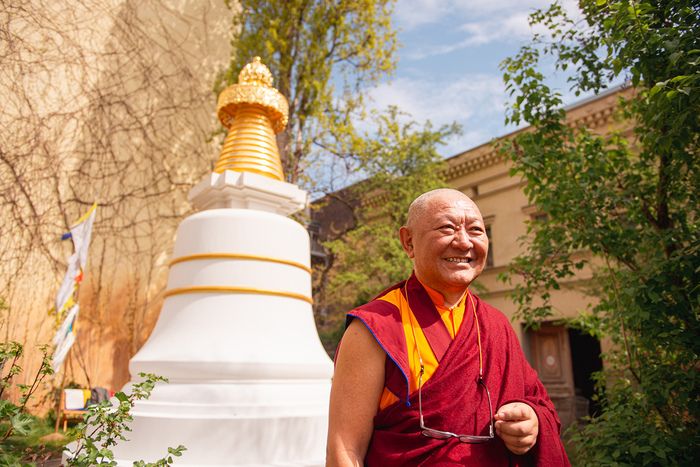
It’s a radiant summer’s day in Berlin, and we’re sitting in the garden at Bodhicharya, the warm and welcoming center founded by Ringu Tulku Rinpoche, about to interview him. There’s a certain nervousness, considering this is one of the very first interviews we’ve ever conducted, and so we’re constantly checking: are the cameras on? Is the microphone attached? Do we have the questions? Luckily, Ringu Tulku arrives, and his kindness and humor immediately put us at ease. That sense of lightheartedness, we soon discovered, is at the heart of his teaching style. We enjoyed ourselves so much, that we re-interviewed Rinpoche two years later and, in this interview, we combine both.
Ringu Tulku Rinpoche is a renowned Tibetan Buddhist master of the Kagyu tradition, recognized for his rare ability to bring complicated aspects of Buddhist philosophy down to earth, so people can use them with their everyday struggles of modern life. Born in Kham, Tibet, and recognized as a tulku at an early age, he studied with many of the greatest masters of the 20th century, including His Holiness the 16th Karmapa and Dilgo Khyentse Rinpoche. Today, he teaches across the globe, is the founder of Bodhicharya International – a worldwide network dedicated to education, social projects, and preserving Tibetan culture – and has authored numerous books that make Buddhist wisdom accessible to readers of all backgrounds.
Across the two conversations, we touched on themes that feel especially urgent today. Ringu Tulku speaks about how to find peace of mind in the middle of busyness and uncertainty and constant distraction. He reflects on anger and activism, urging us to meet the world’s crises not with hostility but with patience, clarity, and above all, introspection. We also explore eco-anxiety, with Ringu Tulku offering a Buddhist lens on how to care for the planet without succumbing to despair. Enjoy!
Study Buddhism: Many people today equate success with constant achievement and acquisition, and even more so if this can be shared on social media. When life is so full and fast, how do we cultivate genuine happiness rather than chasing it?
Ringu Tulku: How busy we are is totally up to us. I think being busy doesn’t really have much to do with happiness and unhappiness. The main problem is that people often think that the more they do and the more possessions they acquire, the happier they’ll get. But in the process of doing that, they get stressed and it all becomes a source of unhappiness.
It’s all about how you approach it. I think I’m pretty happy because I don’t expect everything to be perfect. I don’t expect too much. I have almost no expectations! Sometimes things will go well and sometimes not very well, but I can only do my best. If I try my best and things work out, then great. If they don’t, then at least I’ve done my best, and there’s not much more I can do about it.
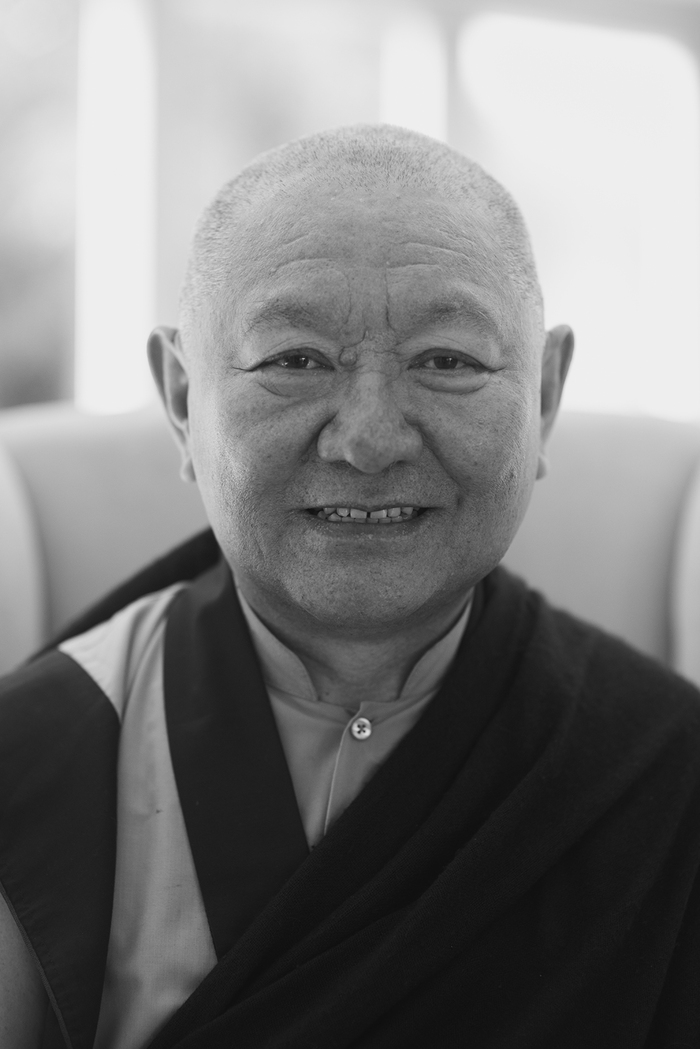
Today, young people have very high expectations. That seems to be the main problem. They don’t seem to really understand what we call “samsara” – that in the world there is lots of pain and suffering. There’s negativity, shortcomings, ignorance, aggression, and the list goes on. These are external problems, but we have these problems within us too. When we deeply understand this, it brings a certain acceptance and also compassion. When we understand that nobody is perfect or when we see something we don’t like, we feel compassion.
So, wherever I go, I feel good! I think happiness is basically peace of mind, an undisturbed mind, and the way to develop such a mind is by learning to accept things and learning to be okay in whatever situation we find ourselves in.
Acceptance sounds the wisest course of action, but in the thick of a crisis it can feel totally impossible. In the moment when things fall apart, what’s the first practical step?
I was once in Belgium, and one lady said, “Oh I cannot take it anymore, I’m at the end of it, I’m going to kill myself.” She said that she’d lost her boyfriend and her job, that she had no money, and so she wanted to die. I told her that if she wanted to die, then nobody could stop her, but before, why not take a trip to India? Sometimes people go to India or somewhere different and then they come back smiling from ear to ear, because they get a more realistic view on life.
This lady ended up going to Japan, but she also came back happy. She said she’d nearly died after falling down a mountain, and she couldn’t get out, and she thought, “This is the end of my life.” At that time, she forgot about the no-boyfriend, no-job, no-money situation – all of those seemed insignificant. Her only thought was, “If only I could get out of here alive, I’d be so happy!” Finally, she was rescued and then came back totally happy.
So, it’s all very relative. We often think we’re in a bad place but, actually, things could be even worse. There’ll always be better and worse situations, and if we see this clearly, then it does help.
Is there a way that we can avoid being swept away by our emotions in the first place? What does working with worry, fear, stress and negativity look like in real time?
How I see and experience the world around me is not totally just about my environment, but it is very strongly connected with how I am, how I feel, how I see the people around me, how I see everything. We know that if we are in a good mood, we see everything as more beautiful, and when we are in a bad mood, we see everything in a more dark way.
The important thing from the Buddhist point of view, therefore, is to watch my own mind and my own emotions, and learn to feel peace, kindness, and positivity, irrespective of what is happening around me. When problems or conflicts occur and my mind is disturbed, then I can sit down, relax, not think about the past or future, and just concentrate on breathing in and breathing out. I can become more peaceful and more joyful at that very moment.
How I feel is not about how everything actually is. Sometimes when we look at the problems, we see lots of problems. And this is how it is: if we look for bad things, problems, difficulties, negative things, we somehow see all of them, and we see them very clearly. Then we become totally engaged in that, and we become very stressed and worried. But at the same time these are only one aspect of the situation.
There are lots of good things also. There are lots of nice things going on. There are lots of positive things happening. If we can focus our mind on those things, then we will naturally feel good, we will naturally feel grateful, we will naturally feel better. I think it is very important to learn how to focus on positive things such as the many positive people around us. If we see that and if we appreciate that, we will feel much better. There are good people, and lots of wonderful things happening in the world.
Still, public anger today feels widespread – about the climate, injustice, corruption. Can anger ever be a useful catalyst, or does it inevitably entangle us? How do we transform it into effective action to solve the world’s problems?
I think we can change the world, but it’s not easy. It’s not easy, because we don’t do it! We all want others to be kind, generous and helpful. We want others to behave well and be patient and tolerant. We want others to work hard and be wise. But just wanting that doesn’t make everybody like that. So, we need to start with ourselves.
We’ve got the six paramitas: generosity, morality, patience, effort, concentration and wisdom. If people tried to develop these a little bit, then they’d be great human beings. If we had more of them, the world would be a great world. But we can’t expect others to do it or force them to. We have to start cultivating these qualities in ourselves. This is the practice of Buddhism – working on ourselves. By doing that, others will slowly see how beneficial these qualities are for everyone. Even if we just conceptually accept and value the idea of them, it can make a great difference.
Of course, there's a lot of negative stuff out there, but being angry doesn’t change that. If I’m too angry and aggressive about it, I actually become part of the problem. Being relaxed and working patiently, cool-headedly, and in a more long-term way is the best method for solving problems.
Many, especially younger people, feel “eco-anxiety” amid slow institutional change from large corporations and governments. From a Buddhist perspective, how do we care for the planet without burning out or collapsing into despair?
The ecological problems we’re facing are not something that just a few people or certain countries can change. It needs everybody in the world involved. Still, some people are very, very worried about it, some people are less worried about it, and some people are not worried at all. But everything is like that, and from the Buddhist point of view, it's always been like that.
The world can only change by starting from individual to individual. And only then you can change the public and you can thereby change the world. It is not totally impossible. But it's not that easy. Everything we do is a step in the right direction. If I do my own minimum thing, then it is a good step, and then if I can talk about it with others, that's also a step forward.
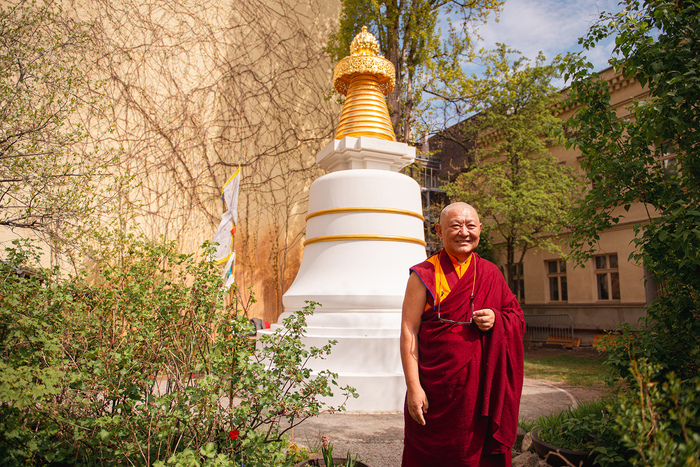
I don't think we should do it with too much stress. I feel that becoming too worried and too anxious is not the solution. We need to do our best and enjoy life and lead our lives as purposefully and meaningfully as possible. Worrying about things too much doesn't work. This is the main teaching also in Buddhism. It’s not useful to be too worried about it or too obsessed with it. If we feel that there is something we can do, then we should do it. And if we can't do it, then it's okay. Who knows what will happen tomorrow?
There are lots of different new innovations, new medicines, new technologies. I heard recently that somebody has found a way to dissolve plastics that pervade the sea. Maybe somebody who is a very good scientist or engineer can find a way to clear all the pollution in the sea and the air and the land in a technological way. I think it is possible. Instead of just worrying and saying, “The government is not doing enough, people are not doing enough, nobody is not doing enough,” we need to focus on studying and experimenting. We cannot do it without science and technology. We need to and can find the solution to our problems.
Lots of people, Buddhist practitioners included, find starting a meditation practice overwhelming. Could you share a short, simple practice for beginners that fits into a busy day?
There is a pocket book created by my students with my teaching materials, called “Lazy Lama Looks at Meditation.” Actually, I am lazy, not because I don’t do things but because I myself am not good at meditation for many hours.
But we have to keep in mind that Buddhism isn’t only about meditation. It is all-round training. People often think they can’t meditate or don’t have time to, and so they can’t practice Buddhism. But you can practice Buddhism even without meditation. There’s also the eightfold path and the six paramitas to study! You can also just practice kindness – that is a great practice, and it doesn’t need a special time or place. This is the main point. Tolerance, patience, behaving well, we need to make these things a part of our life. It shouldn’t become something we spend a few minutes a day on. How we see things, how we react to things, how we live our life – this is the true practice of Dharma.
A great way to start with anything such as meditation is to look at our motivation. “What is it I’m doing and why? What is my ultimate goal?” Then we can be very clear about where we’re going and what we need to train in.
This is fantastic advice. Apart from being crystal clear about our motivation, is there anything else we should do or reflect on before meditation?
Buddha said that ethics is like the ground. Generally, we talk about three principal trainings. Every Buddhist has to train in these three principal trainings, the first of which is ethics. The second is meditation, and the third is wisdom. Without ethics you cannot behave in the right way. Ethics ensures that you refrain from doing harmful things to yourself and others, and you try to do something positive, and you can grow. Ethics is the basis in the Shravakayana, Bodhisattvayana, and Vajrayana. Vinaya is the basic ethics. Not everybody has to become a monk or nun, but the basic Vinaya ethics must be observed by all Bodhisattvayana and Vajrayana practitioners.
Turning to Buddhist practice, Om Mani Padme Hum is recited widely, and His Holiness the Dalai Lama urges practitioners to reflect on its meaning. How would you unpack this mantra so that recitation becomes a lived practice, not just a sound?
OM is regarded not only by Buddhists, but also by Hindus, as the source of all the sounds. Sometimes it's described the combination of A, O, and MA. These three letters are supposed to represent the body, speech, and mind of all the enlightened beings. Therefore, OM is the beginning of every mantra.
MANI in Sanskrit means jewel. There is a legendary belief that there's a wish-fulfilling jewel, and if you wash it, first in seawater, then in sweet water, maybe milk also, and then you put it on the banner, and perform prayers, then whatever you want comes down from the sky. That's the wish-fulfilling jewel. The jewel represents compassion.
From the Buddhist point of view, compassion brings all good things to you and all good things to others. It brings good things to yourself, because all our problems, all our sufferings are created because of our own negative emotions like anger, hatred, greed, attachment, jealousy, envy, pride, and too much arrogance and confusion. The positive sides of these negative emotions are compassion and wisdom. Sometimes even wisdom comes out of compassion. The more we can develop compassion, the less we will have all these negative emotions and their effects. Therefore, compassion is good for us. It's good for others too because if we have compassion then we will also try our best to be helpful and do good for everybody else.
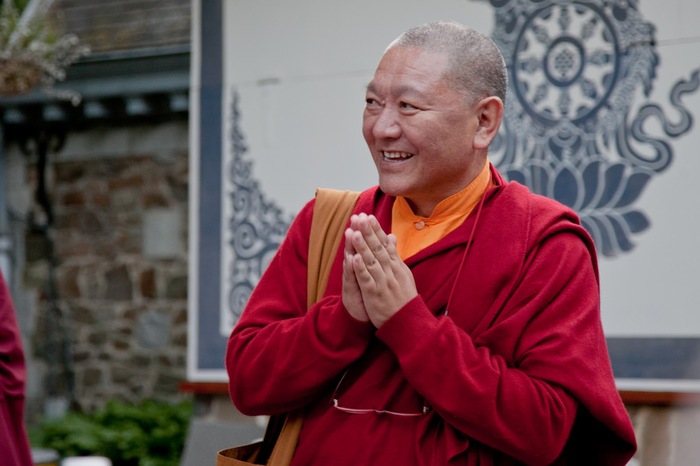
PADMA means lotus flower. The lotus flower represents purity. Something that is not stainable, something that you cannot make dirty. Because the lotus flower, even if it is growing in the most polluted area, will always look completely fresh and clean. It represents something immaculate, something that's never been touched by negative things. It represents wisdom. When a lamp is lit in a dark place, even if that dark place was dark for thousands of years, it becomes light straight away, it doesn't take long.
MANI PADME thus means “jewel in the lotus,” and is the name of Avalokiteshvara, the Bodhisattva of Compassion. When you are talking about Avalokiteshvara, you are talking about wisdom and compassion.
HUM represents “I am that” or “I want to be like that”, or “May this be achieved.” So, when you say Om Mani Padme Hum, it's like a suggestion to yourself, “May my compassion and wisdom, (jewel in the lotus) blossom. May I actualize the qualities of Avalokiteshvara, the enlightened Bodhisattva.”
Much of life now happens online – remote work and even online exercise classes are the norm for many people – yet more and more people report feeling lonelier than ever. How can we cultivate genuine connection and soften loneliness in a digital age?
I can see this myself. Before, when I used to travel by train, by bus or by plane, people used to talk to each other and have lots of kinds of discussions. Now, everybody is on their own, looking at their own phone, never talking to each other. It’s a problem.
However, I think how lonely you are is not really to do with how many people surround you, or how much communication you have, but about how you are, how you feel about your friendships.
I don't know whether it's correct or not, but I feel that both in the developed world and developing worlds, there's so much competition. Education itself is about competing. We see everybody as our competitor. If we see everybody around us as our competitors, we can't be associates, we can't be close friends, we can't feel supported or very together.
We make ourselves lonely. But we need friendships.
Many people think, “Oh, I have no friends.” So, you sit there, waiting for friends to come and say, “Hello, from today, I want to become your friend.” I don't think that's how it works! Friendship means I have to become a friend to others, I have to genuinely wish to be nice, kind, and helpful. Then the other person will also reciprocate more or less in the same way, and then we become friends.
I think loneliness is basically in our own inner attitude, which we have to change. I also think the more meaningful your life is, and the more self-confidence you have, the less lonely you are.
Lots of us, especially younger people, have an addiction to being online: we simply cannot stop going on social media, endlessly streaming tv shows or playing video games. And yet, at the same time, people often say that they’re bored, despite access to anything anywhere anytime! What are your thoughts on this?
I know about these issues, but I don't know how to deal with them! Actually, there are two things here – distraction, and boredom. I need to tell you that I have got the realisation of boredom. I don't have the realisation of enlightenment, but I have the realisation of boredom!
When we were small and studying English, none of our teachers knew a word of Tibetan. When they introduced a new word to us, we had to think what is the Tibetan word for this? What is the Tibetan word for that? So, what is boredom? We didn’t really know! And then, many, many years later, I discovered boredom. I was in the USA at Naropa University in Boulder, in Colorado, and they gave me a very nice apartment with a huge TV with 300 or 500 channels. I had just two classes a week and so I thought I would enjoy myself. And I was sitting there watching this TV and going up, up, up, and down, down, down the channels, the whole day almost.
And then after some time, I'm feeling something not so nice. I was kind of unsatisfied, unsettled. Nothing was fulfilling my expectations. Feeling a little bit unhappy. And I said, “Oh, I think this is boredom!”
We always want to be distracted, and so we are always listening to music, we are watching TV, we are going around trying to engage ourselves. I think wanting to be distracted is our habitual tendency. Facebook and video games are very distracting. When you get into it, you don’t realize how time passes. I don’t think they are very useful, but at the same time there are some good things, and lots of good information you can find through the internet, so it depends where you focus.
I think the most important thing is to understand how much time we waste on these things. Once we do, then we need to apply patience and discipline. I think that's the important thing. It’s not always easy, but it is a decision we need to make ourselves.
You can say, “Okay, I’ll play video games, but only for this much time,” and that discipline is something very, very useful. It's our own decision. It's self-discipline. And we make a decision based on what we think is useful and good for ourselves and maybe others also. Once we make that decision and we follow that, it becomes easy because we don't have to think, “Should I? Or should I not?” Our energy is usually taken up by trying to make the decision whether we should do something or not do it. Once we have this kind of clarity of, “I will do this, and I will not do this,” then life becomes very simple. If I follow that, I feel much happier with myself. It gives me self-confidence, that I’m doing what I know is good for me.
Many Buddhist practitioners understand “bardo” as the period between death and rebirth, but in Life, Death and The Bardo, you write about the endless cycle of experience as the four bardos: life, death, after-death, and rebirth. Can you tell us more?
The four bardos teach us that there are always opportunities for us. Bardo in Tibetan means “in between,” or “in transition,” and from the Buddhist point of view we are always in transition. So, life itself is bardo. The first bardo is the bardo of life. From the time we are born, till we start to die, is the bardo of living.
Then the actual process of dying is called the bardo of dying. Because that's also a transition. After that, there is supposed to be a moment where your consciousness dissolves into the most subtle state of your awareness. That's called bardo of clear light.
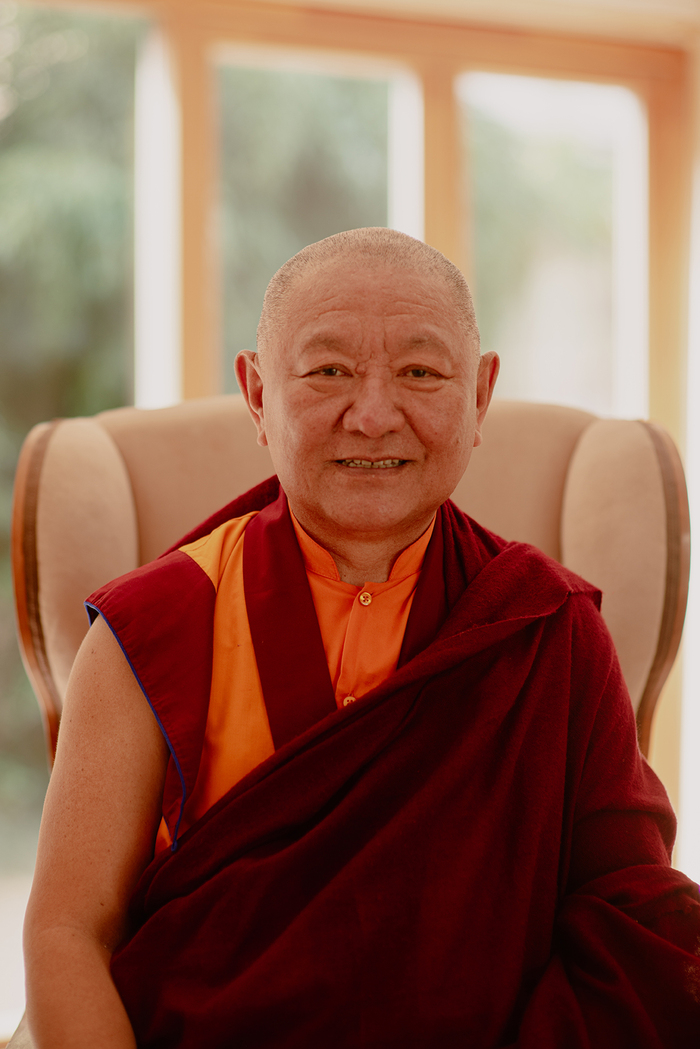
Each of these moments are very important because each of these bardos are seen as an opportunity. They are not seen as something ending or bad. Instead, each bardo is an opportunity. In the bardo of living we can transform ourselves, we can completely enlighten ourselves in this life. Not only is the bardo of living full of opportunities, but the bardo of dying is also an opportunity. If in the process of dying we can see and understand things, if we can connect with something, if we can use that opportunity in a good way, we can also completely transform and be reborn in a very good life. So, the bardo of dying is also an opportunity. The bardo of clear light is also a great opportunity because that's when your mind is in the most subtle state. Your Buddha-nature is present there. Your mind is free from all thoughts and emotions. If we can recognize that, we can be also enlightened at that time. So, it's very important, but not so easy.
Then, the bardo of becoming is the period after we die, before we take our next birth. This is also a very important moment because we have no material body at that time, and so we can go wherever we want. At this time, if we can think about a paradise or Buddha realm or a great enlightenment being, we are immediately there. So, how our mind is concentrated or focused becomes extremely important at that time.
Polarization is rising, even within Buddhist communities. How can we be genuinely non-sectarian while remaining rooted in our chosen lineage and its practices?
Many great Tibetan masters followed the Rimé tradition or Rimé philosophy. Rimé means that there's no division, no barrier. The main understanding of Rimé is that Buddha taught many different paths. It's said the Buddha taught 84,000 different paths. Why did he do that? Because different people need slightly different approaches and different emphasis and different paths. With this idea you cannot say that my school is the best one. From a Buddhist point of view, it's not about whether it is the best or not, but what is suitable for that person.
Also, it's not that if something is not the ultimate thing, then it's useless. It's not like that. Even the most ultimate thing is beyond those concepts! That is not something you can have in an explanation, or in school or in literature or something like that.
If you have your own lineage, and if you have trust, if you have an understanding, and if you find practices of the lineage very useful, then practice that! You don't need to go everywhere and try everything. That is good enough for you, so you need to hold on to that.
It's important not to look down on other traditions, because all others are just as good and as useful. Especially what we call the “eight practice lineages” that come directly from India, from Buddha, from the great masters of India. They are genuine, profound, and authentic.
We can also extend this attitude to everybody else and to different religions. If we can do that, then I think we can live happily together and benefit from each other. It's not that everybody has to believe or practice the same thing. Difference is a good thing. We should have variety.
As I said, Buddha taught different things and different ways. The difference is necessary, and these differences have to be preserved. These differences should not be erased. We have to value them as they benefit different people. Therefore, differences are to be appreciated and accepted.
It's not trying to unite everything as one and not trying to say that we are all the same. Yes, basically, we are all the same, there are lots of similarities, but there's also differences, and the differences are not something bad that you have to hate, or you have to get rid of, but it's something that we have to appreciate. That understanding is, I think, the important part!
Wonderful. Thank you so much, Ringu Tulku, for sharing with us your profound wisdom on two separate occasions!